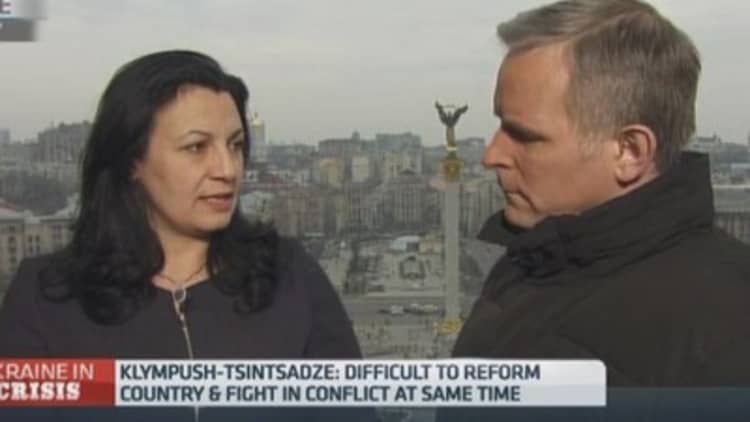The International Monetary Fund (IMF) may have thrown Ukraine a lifeline, but the country needs restructure its mountain of hard currency debt before the economy stabilizes, analysts warn.
"It looks all but inevitable that Ukraine will [now] need to restructure its public debts, but there's a huge amount of uncertainty about what the restructuring might look like," said Capital Economics' senior emerging markets economist William Jackson in the note.
Conflict with pro-Russian separatists in eastern Ukraine that started last year has devastated the country's economy. Ukraine's currency, the hryvnia, has depreciated around 40 percent since the beginning of the year, more than doubling the country's debt-to-gross-domestic-product ratio to around 95 percent in local currency terms, according to a Capital Economics note published on Wednesday.
And while the IMF extended a fresh $17.5 billion four-year loan to "support immediate economic stabilization" in Ukraine on Wednesday, that may not be enough.
"[With] less than $6 billion in international reserves and national bank expenditures at about $1 billion per month, Ukraine will need to negotiate with some of its major bondholders to either reduce bond principals or cut interest rates," Stratfor Global Intelligence said in a note published on Wednesday.
Which debt?
A sizeable chunk of Ukraine's debt is owed to domestic investors and international institutions. But the government can probably prevail on local banks and international organizations to roll over their share – 30 percent and 10 percent, respectively – analysts say.

That leaves the $17 billion of Eurobonds as the most likely candidate for a debt restructuring, of which U.S. fund manager Franklin Templeton owns $8 billion and the Russia government owns $3 billion, Capital Economics said, citing media reports.
Russia, which is seen as backing the rebels in the east, will not be in a position to obstruct proceedings, analysts say. It owns less than 20 percent of the principal and will not be able to veto any future agreements which require a two-third majority.
Franklin Templeton did not respond to emails from CNBC requesting comment.
Looming deadlines
Some sort of resolution will need to be reached in the coming months because around $4 billion of the Eurobonds are due in the fourth quarter of 2015.
Investors for their part appear to be preparing for a default: the spread on Ukraine's five-year sovereign credit default swaps were trading between 3,462 and 3,771 basis points, according to Markit data. They have widened by 68.3 percent over the past month.
Beyond meeting upcoming redemptions, Ukraine faces the challenge of stabilizing its economy, while financing military operations in the East.
"The main effort for the government, at least in the near- to medium-term, is to prioritize achieving macroeconomic stability while financing military operations in the country's east," said Stratfor Global Intelligence.
Limited impact
The consequences of a default may be limited outside of Ukraine because the size of the country's debt is quite small, however.
A default by Ukraine will probably fade from the headlines fairly quickly, according to Mizuho Securities senior credit analyst Ryosuke Kaneko, citing the precedent set by Argentina last year.
The major international banks' exposure to Argentina was around $30 billion and to the Ukraine, is around $20bn, he said.
"[A default] is very unlikely to have a wider impact on the global financial system ," he said.

